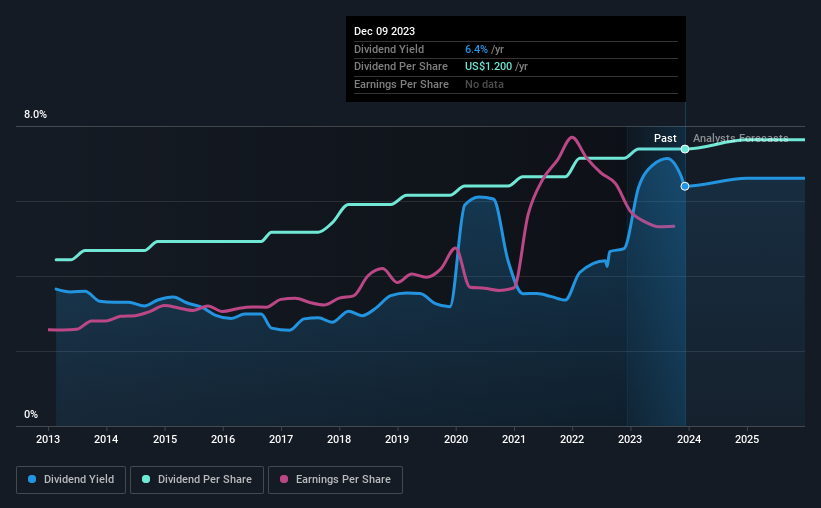Financial Institutions, Inc. (NASDAQ:FISI) Looks Like A Good Stock, And It's Going Ex-Dividend Soon
Readers hoping to buy Financial Institutions, Inc. (NASDAQ:FISI) for its dividend will need to make their move shortly, as the stock is about to trade ex-dividend. Typically, the ex-dividend date is one business day before the record date which is the date on which a company determines the shareholders eligible to receive a dividend. It is important to be aware of the ex-dividend date because any trade on the stock needs to have been settled on or before the record date. In other words, investors can purchase Financial Institutions' shares before the 13th of December in order to be eligible for the dividend, which will be paid on the 2nd of January.
The company's upcoming dividend is US$0.30 a share, following on from the last 12 months, when the company distributed a total of US$1.20 per share to shareholders. Looking at the last 12 months of distributions, Financial Institutions has a trailing yield of approximately 6.4% on its current stock price of $18.77. We love seeing companies pay a dividend, but it's also important to be sure that laying the golden eggs isn't going to kill our golden goose! We need to see whether the dividend is covered by earnings and if it's growing.
View our latest analysis for Financial Institutions
If a company pays out more in dividends than it earned, then the dividend might become unsustainable - hardly an ideal situation. That's why it's good to see Financial Institutions paying out a modest 36% of its earnings.
Companies that pay out less in dividends than they earn in profits generally have more sustainable dividends. The lower the payout ratio, the more wiggle room the business has before it could be forced to cut the dividend.
Click here to see the company's payout ratio, plus analyst estimates of its future dividends.
Have Earnings And Dividends Been Growing?
Companies with consistently growing earnings per share generally make the best dividend stocks, as they usually find it easier to grow dividends per share. If earnings decline and the company is forced to cut its dividend, investors could watch the value of their investment go up in smoke. With that in mind, we're encouraged by the steady growth at Financial Institutions, with earnings per share up 9.3% on average over the last five years.
Many investors will assess a company's dividend performance by evaluating how much the dividend payments have changed over time. Financial Institutions has delivered 5.2% dividend growth per year on average over the past 10 years. It's encouraging to see the company lifting dividends while earnings are growing, suggesting at least some corporate interest in rewarding shareholders.
Final Takeaway
From a dividend perspective, should investors buy or avoid Financial Institutions? Financial Institutions has seen its earnings per share grow slowly in recent years, and the company reinvests more than half of its profits in the business, which generally bodes well for its future prospects. We think this is a pretty attractive combination, and would be interested in investigating Financial Institutions more closely.
While it's tempting to invest in Financial Institutions for the dividends alone, you should always be mindful of the risks involved. To help with this, we've discovered 1 warning sign for Financial Institutions that you should be aware of before investing in their shares.
If you're in the market for strong dividend payers, we recommend checking our selection of top dividend stocks.
Have feedback on this article? Concerned about the content? Get in touch with us directly. Alternatively, email editorial-team (at) simplywallst.com.
This article by Simply Wall St is general in nature. We provide commentary based on historical data and analyst forecasts only using an unbiased methodology and our articles are not intended to be financial advice. It does not constitute a recommendation to buy or sell any stock, and does not take account of your objectives, or your financial situation. We aim to bring you long-term focused analysis driven by fundamental data. Note that our analysis may not factor in the latest price-sensitive company announcements or qualitative material. Simply Wall St has no position in any stocks mentioned.

